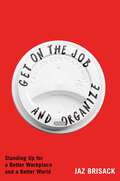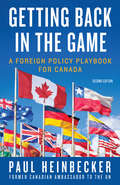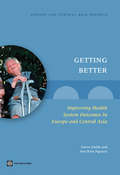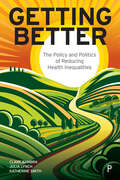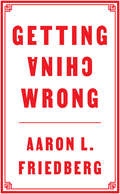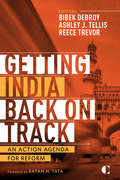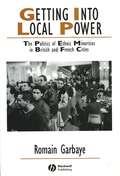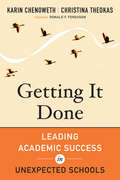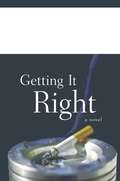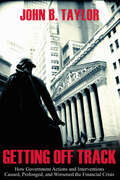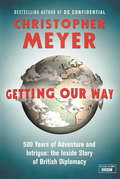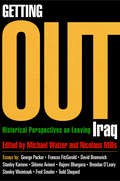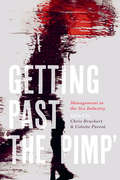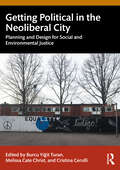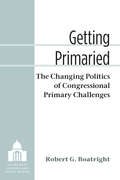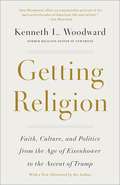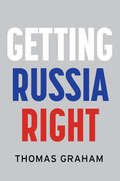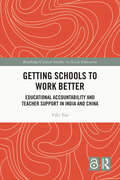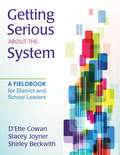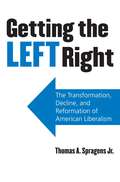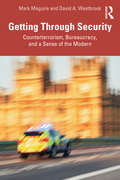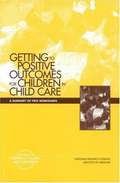- Table View
- List View
Get a Life: You Don't Need a Million to Retire Well (5th edition)
by Ralph WarnerWarner founded Nolo Press in 1971, built the company and authored or co-authored many of its books, and happily retired. This updated edition of his compendium of advice, interviews, and exemplar cases includes coverage of finances, lifestyle choices, and coping strategies as well as new health research and information about how to prepare for retirement while still in midlife. Annotation ©2004 Book News, Inc., Portland, OR (booknews.com)
Get on the Job and Organize: Standing Up for a Better Workplace and a Better World
by Jaz BrisackFor fans of Fight Like Hell and A History of America in Ten Strikes, the leader of the Starbucks and Tesla union movements shares stories from the front lines to help us organize our own workplaces.Get on the Job and Organize is a compelling, inspirational narrative of the Starbucks and Tesla unionization efforts, telling the broader story of the new, nationwide labor movement unfolding in our era of political and social unrest. As one of the exciting new faces of the American Labor Movement, Jaz Brisack argues that while workers often organize when their place of work is toxic, it&’s equally important to organize when you love your job. With an accessible voice and profound insight, Brisack puts everything into the context of America&’s long tradition of labor organizing and shows us how we too can organize our workplaces, from how to educate yourself and your colleagues, to what backlash can be expected and how to fight it, to what victory looks like even if the union doesn&’t necessarily &“win.&”
Getting Back in the Game: A Foreign Policy Handbook for Canada
by Paul HeinbeckerPaul Heinbecker has a compelling vision for the future of Canadian foreign policy and argues that Canada still has a role to play in the rehabilitation of global governance. Has Canada lost its place in the world? Are we destined for a future as a middle power, denied a seat at the "grown-ups table"? Some would argue yes, that decades of neglect and inattention have rendered Canadian foreign policy ineffective at best and non-existent at worst. Paul Heinbecker disagrees. The golden days of Lester B. Pearson may be long gone, he contends (and perhaps they weren’t quite as "golden" as we’d all like to remember), but Canada still has a part to play. In Getting Back in the Game, Heinbecker presents his compelling vision for the future of Canadian foreign policy, a future in which Canada can work both with the United Nations and apart from it; in which our government can take a stand and effect change on issues of the day from climate change to the Middle East; in which this country has a key role to play in the rehabilitation of global governance.
Getting Better
by Son Nam Nguyen Owen SmithFifty years ago, health outcomes in the countries of Eastern Europe and Central Asia were not far behind those in Western Europe and well ahead of most other regions of the world. But progress since then has been slow. While life expectancy in the ECA region today is close to the global average, the gap with its western neighbors has doubled, and other middle-income regions have all surpassed ECA. Some countries in the region are doing better, but full convergence with the world's most advanced health systems is still a long way off. At the same time, survey evidence suggests that the health sector is the top priority for additional investment among populations across the region. The experience of high-income countries also suggests that popular demand for strong and accessible health systems will only grow over time. Yet these aspirations must be reconciled with current fiscal realities. In brief, health sector issues are a challenge here to stay for policy-makers across the ECA region. This report draws on new evidence to explore the development challenge facing health sectors in ECA, and highlights three key agendas to help policy-makers seeking to achieve more rapid convergence with the world's best performing health systems. The first is the health agenda, where the task is to strengthen public health and primary care interventions to help launch the "cardiovascular revolution" that has taken place in the West in recent decades. The second is the financing agenda, in which growing demand for medical care must be satisfied without imposing undue burden on households or government budgets. The third agenda relates to broader institutional arrangements. Here there are some key reform ingredients common to most advanced health systems that are still missing in many ECA countries. A common theme in each of these three agendas is the emphasis on improving outcomes, or "Getting Better".
Getting Better: The Policy and Politics of Reducing Health Inequalities
by Clare Bambra Julia Lynch Katherine E. SmithAvailable open access digitally under CC-BY-NC-ND licence. Health inequality has reached a crisis point. Your income or hometown can have a devastating impact on how well and how long you live. This injustice, exacerbated during the COVID-19 pandemic, continues as the cost of living rises and other sources of inequity grow. What can be done to make things better? This book, written by the authors behind the award-winning The Unequal Pandemic, explores successful international case studies of governments reducing health inequalities – from the USA and Brazil to Germany and England – stretching over fifty years from the 1960s to the 2000s. Essential reading for students and scholars of public health and the social sciences, and for health and social care professionals and policy makers, this book demonstrates that reducing health inequalities is possible and provides a roadmap for today’s governments to follow.
Getting China Wrong
by Aaron L. FriedbergThe West’s strategy of engagement with China has failed. More than three decades of trade and investment with the advanced democracies have left that country far richer and stronger than it would otherwise have been. But growth and development have not caused China’s rulers to relax their grip on political power, abandon their mercantilist economic policies, or accept the rules and norms of the existing international system. To the contrary: China today is more repressive at home, more aggressive abroad, and more obviously intent on establishing itself as the world’s preponderant power than at any time since the death of Chairman Mao. What went wrong? Put simply, the democracies underestimated the resilience, resourcefulness, and ruthlessness of the Chinese Communist Party. For far too long, the United States and its allies failed to take seriously the Party’s unwavering determination to crush opposition, build national power, and fulfill its ideological and geopolitical ambitions. In this timely and powerfully argued study, Aaron Friedberg identifies the assumptions underpinning engagement, describes the counterstrategy that China’s Communist Party rulers devised in order to exploit the West’s openness while defeating its plans, and explains what the democracies must do now if they wish to preserve their prosperity, protect their security, and defend their common values.
Getting India Back on Track
by Ashley J. Tellis Reece Trevor Bibek DebroyIndia has fallen far and fast from the runaway growth rates it enjoyed in the first decade of the twenty-first century. In order to reverse this trend, New Delhi must seriously reflect on its policy choices across a wide range of issue areas. Getting India Back on Track broadly coincides with the 2014 Indian elections to spur a public debate about the program that the next government should pursue in order to return the country to a path of high growth. It convenes some of India's most accomplished analysts to recommend policies in every major sector of the Indian economy. Taken together, these seventeen focused and concise memoranda offer policymakers and the general public alike a clear blueprint for India's future.ContentsForewordRatan N. Tata (Chairman, Tata Trusts)IntroductionAshley J. Tellis and Reece Trevor (Carnegie Endowment for International Peace)1. Maintaining Macroeconomic StabilityIla Patnaik (National Institute of Public Finance and Policy)2. Dismantling the Welfare StateSurjit Bhalla (Oxus Investments)3. Revamping Agriculture and the Public Distribution SystemAshok Gulati (Commission for Agriculture Costs and Prices)4. Revisiting Manufacturing PolicyRajiv Kumar (Centre for Policy Research)5. Generating EmploymentOmkar Goswami (Corporate and Economic Research Group)6. Expanding Education and SkillsLaveesh Bhandari (Indicus Analytics)7. Confronting Health ChallengesA. K. Shiva Kumar (National Advisory Council)8. Accelerating Infrastructure ModernizationRajiv Lall and Ritu Anand (IDFC Limited)9. Managing UrbanizationSomik Lall and Tara Vishwanath (World Bank)10. Renovating Land ManagementBarun S. Mitra (Liberty Institute) and Madhumita D. Mitra (consultant)11. Addressing Water ManagementTushaar Shah (International Water Management Institute) and Shilp Verma (independent researcher)12. Reforming Energy Policy and PricingSunjoy Joshi (Observer Research Foundation)13. Managing the EnvironmentLigia Noronha (Energy and Resources Institute)14. Strengthening Rule of LawDevesh Kapur (University of Pennsylvania) and Milan Vaishnav (Carnegie Endowment for International Peace)15. Correcting the Administrative DeficitBibek Debroy (Centre for Policy Research)16. Building Advanced Technology Capacity for Competitive Arms AcquisitionRavinder Pal Singh (Stockholm International Peace Research Institute)17. Rejuvenating Foreign PolicyC. Raja Mohan (Observer Research Foundation and Carnegie Endowment for International Peace
Getting Into Local Power: The Politics of Ethnic Minorities in British and French Cities (IJURR Studies in Urban and Social Change Book Series #62)
by Romain GarbayeThis book presents a comparison of the patterns of ethnic minority politics in British and French city politics. A comparison of the participation of ethnic minorities in British and French cities Includes direct comparisons of particular cities Birmingham, Lille and Roubaix Shows how ethnic and cultural diversity translates into political conflict in different political systems Considers styles of political mobilisation of ethnic minorities in the context of urban political systems, as well as the strategies used by party leaders and to manage ethnic diversity in political competition Analyses how ethnic and cultural diversity in urban societies translates into conflictual politics Enhances our understanding of local politics and of the evolution of political representation in industrialised democracies
Getting It Done: Leading Academic Success in Unexpected Schools
by Karin Chenoweth Ronald F Ferguson Christina Theokas"Getting It Done describes in clear and helpful detail what leaders of successful high-poverty and high-minority schools have done to promote and sustain student achievement. It follows two celebrated books by Karin Chenoweth: "It's Being Done," which established that the work of educating all children is possible, and How It's Being Done, which examined the structures and processes necessary to support academic success. Getting It Done turns to the crucial issue of school leadership, exploring how school leaders have promoted unprecedented levels of school and student achievement. A book that focuses on real leaders--and on the knowledge and skills that they have employed on behalf of heightened achievement--Getting It Done will be essential reading for school leaders, and for all who believe that a successful education can be attained by all students."
Getting It Done: Leading Academic Success in Unexpected Schools
by Karin Chenoweth Christina Theokas"Getting It Done describes in clear and helpful detail what leaders of successful high-poverty and high-minority schools have done to promote and sustain student achievement. It follows two celebrated books by Karin Chenoweth: &“It&’s Being Done,&” which established that the work of educating all children is possible, and How It&’s Being Done, which examined the structures and processes necessary to support academic success. Getting It Done turns to the crucial issue of school leadership, exploring how school leaders have promoted unprecedented levels of school and student achievement. A book that focuses on real leaders—and on the knowledge and skills that they have employed on behalf of heightened achievement—Getting It Done will be essential reading for school leaders, and for all who believe that a successful education can be attained by all students."
Getting It Right: A Novel
by William F. Buckley Jr.This book is a sweeping tale that takes us from the Hungarian uprising of 1956, Cold War espionage, and tempestuous romance, to political skulduggery in 1960's America.
Getting Off Track: How Government Actions and Interventions Caused, Prolonged, and Worsened the Financial Crisis
by John B. TaylorIn this concise volume, leading economist John B. Taylor offers empirical research to explain what caused the current financial crisis, what prolonged it, and what dramatically worsened it more than a year after it began. The evidence he presents strongly suggests that specific government actions and interventions are largely to blame and that any future government interventions must be based on a clearly stated diagnosis of the problem and a rationale for the interventions.
Getting Our Way: 500 Years of Adventure and Intrigue: the Inside Story of British Diplomacy
by Christopher MeyerOver the last five hundred years, Britain's power has waxed and waned: from the puny island nation of the sixteenth century, to the global superpower of the nineteenth century, to the more modest post-imperial status today of a major European power. But in these radically different circumstances, the wisdom of Lord Palmerston's observation has endured.Getting Our Way recounts nine stories from Britain's diplomatic annals over the last five hundred years, in which the diplomats themselves are at the centre of the narrative. It is an inside account of their extraordinary experiences, sometimes in the face of physical danger, often at history's hinge. Be it Henry Killigrew's mission to Edinburgh in 1572, Castlereagh at the Congress of Vienna, Our Man in Washington and the Nassau Deal, or the handover of Hong Kong to China, we can see how Britain has viewed its interests in the world and sought to advance them.Some of these dramatic episodes record triumph, some failure, but all of them illustrate how the three pillars of the national interest - security, prosperity and values - have been the foundation of British foreign policy for half a century. Each story is illuminated by colourful anecdotes and insights drawn from Christopher Meyer's first-hand experience of international relations.Moreover, the book is a salutary reminder that foreign policy (what is to be done) and diplomacy (how it is to be done) begin and end with the national interest. And far from being the preserve of aloof aristocrats, the pursuit of our national interest is replete with intrigue, treachery, espionage, and danger - an extraordinary combination of high principle and low cunning, vice and virtue, all with the specific aim of 'getting our way'.
Getting Our Way: 500 Years of Adventure and Intrigue: the Inside Story of British Diplomacy
by Sir Christopher MeyerA highly informed insider's account of some of the 'honest men' as they sought, by fair means or foul, to get Britain its way in the world.GETTING OUR WAY recounts nine stories from Britain's diplomatic annals over the last five hundred years, in which the diplomats themselves are at the centre of the narrative. It is an inside account of their extraordinary experiences, sometimes in the face of physical danger, often at history's hinge. Be it Henry Killigrew's mission to Edinburgh in 1572, Castlereagh at the Congress of Vienna, Our Man in Washington and the Nassau Deal, or the handover of Hong Kong to China, we can see how Britain has viewed its interests in the world and sought to advance them. Some of these dramatic episodes record triumph, some failure, but all of them illustrate how the three pillars of the national interest - security, prosperity and values - have been the foundation of British foreign policy for half a century. Each story is illuminated by colourful anecdotes and insights drawn from Christopher Meyer's first-hand experience of international relations. Moreover, the book is a salutary reminder that foreign policy and diplomacy begin and end with the national interest. And far from being the preserve of aloof aristocrats, the pursuit of our national interest is replete with an extraordinary combination of high principle and low cunning, vice and virtue, all with the specific aim of 'getting our way'.
Getting Out
by Nicolaus Mills Michael WalzerEventually every conqueror, every imperial power, every occupying army gets out. Why do they decide to leave? And how do political and military leaders manage withdrawal? Do they take with them those who might be at risk if left behind? What are the immediate consequences of departure? For Michael Walzer and Nicolaus Mills, now is the time to ask those questions about exiting--and to worry specifically about the difficulties certain to arise as we leave--Iraq.Getting Out approaches these issues in two sections. The first, entitled "Lessons Learned," examines seven historical cases of how and how not to withdraw: Britain's departure from the American colonies and from India, the French withdrawal from Algeria, Israel's unilateral withdrawal from Gaza, and the U.S. decision to leave (or not leave) the Philippines, Korea, and Vietnam. These cases offer a comparative perspective and an opportunity to learn from the history of political and military retreats.The second section, "Exiting Iraq," begins with an introduction to just how the United States got into Iraq and continues with an examination of how the U.S. might leave from a diversity of voices, ranging from those who believe that the Iraq war has produced no real good to those who hope for a decent ending. In addition to essays by volume editors Walzer and Mills, Getting Out features contributions by Shlomo Avineri, Rajeev Bhargava, David Bromwich, Frances FitzGerald, Stanley Karnow, Brendan O'Leary, George Packer, Todd Shepard, Fred Smoler, and Stanley Weintraub.
Getting Past "the Pimp": Management in the Sex Industry
by Chris Bruckert Colette ParentThe issue of third parties in the sex industry – individuals who are neither the client nor the service provider – has become especially urgent in our current socio-political context. Surprisingly, in spite of an emergence of critical scholarship on the sex industry, as well as recommendations by key governmental committees, little attention has been extended to examining the role of individuals labelled pimps, procurers, and traffickers. Addressing the function of third parties on the street and indoors, Getting Past "the Pimp" incorporates solid empirical evidence including documentary analysis, 75 interviews with third parties, and 52 interviews with sex workers to unpack the roles and relationships of third parties in three sectors of the sex industry‒ incall/outcall, stripping, and street-based prostitution. Contrary to prevailing stereotypes that portray third parties as inherently abusive and controlling, these workers fulfill important roles and provide vital services as associates, fee-for-service hires, and agency owners or managers responsible for scheduling and arranging transportation and security. The sex industry, like mainstream businesses, rarely depend exclusively on client and worker to operate efficiently, and safely.
Getting Political in the Neoliberal City: Planning and Design for Social and Environmental Justice
by Cristina Cerulli Burcu Yiğit Turan Melissa Cate ChristIn a world defined by ever-deepening crises—climate, social, economic, and political—urban spaces emerge as both battlegrounds of injustice and the arenas of possibility. Getting Political in the Neoliberal City interrogates the roles of planners, architects, designers, and urban citizens in challenging the pervasive inequities of neoliberal urbanism. Drawing from critical case studies spanning continents and disciplines, this volume reframes the intersections of spatial and social justice to illuminate how space becomes a site of power, exclusion, and potential resistance.Through incisive essays and reflective scholarship, this book explores how cities are shaped by market forces and neoliberal governance, yet also serve as sites for insurgent practices at various scale, grassroots movements, and alternative imaginaries that resist dominant modes of urbanization and claim just ways of making cities. Highlighting the emergencess of new epistemologies, subjectivities and critical agencies, Getting Political in the Neoliberal City calls for a transformative rethinking of urban and environmental planning, design, and citizenship.Featuring contributions from scholars and practitioners in diverse fields, including architecture, geography, political science, and anthropology, the book maps the tensions between depoliticized scholarly and professional practices and the urgent need for politicized action. With compelling examples from Australia, Brazil, Cyprus, Denmark, Germany, Hong Kong, the USA, and Sweden, this book offers fresh insights into ongoing research on the struggles for more equitable, inclusive, and environmentally just cities. It also provides opportunities to understand the historical contextuality of each case and to reflect on the nuances, similarities, and global connections between different cases across different geographies.
Getting Primaried: The Changing Politics of Congressional Primary Challenges
by Robert G BoatrightEach of the past few election cycles has featured at least one instance of "primarying," a challenge to an incumbent on the grounds that he or she is not sufficiently partisan. For many observers, such races signify an increasingly polarized electorate and an increasing threat to moderates of both parties. In Getting Primaried, Robert G. Boatright shows that primary challenges are not becoming more frequent; they wax and wane in accordance with partisan turnover in Congress. The recent rise of primarying corresponds to the rise of national fundraising bases and new types of partisan organizations supporting candidates around the country. National fundraising efforts and interest group-supported primary challenges have garnered media attention disproportionate to their success in winning elections. Such challenges can work only if groups focus on a small number of incumbents. Getting Primaried makes several key contributions to congressional scholarship. It presents a history of congressional primary challenges over the past forty years, measuring the frequency of competitive challenges and distinguishing among types of challenges. It provides a correction to accounts of the link between primary competition and political polarization. Further, this study offers a new theoretical understanding of the role of interest groups in congressional elections.
Getting Religion: Faith, Culture, and Politics from the Age of Eisenhower to the Era of Obama
by Kenneth L. Woodward"In this thoughtful book, Ken Woodward offers us a memorable portrait of the past seven decades of American life and culture. From Reinhold Niebuhr to Billy Graham, from Abraham Heschel to the Dali Lama, from George W. Bush to Hillary Clinton, Woodward captures the personalities and charts the philosophical trends that have shaped the way we live now." -Jon Meacham, author of Destiny and PowerImpeccably researched, thought-challenging and leavened by wit, Getting Religion, the highly-anticipated new book from Kenneth L. Woodward, is ideal perfect for readers looking to understand how religion came to be a contentious element in 21st century public life. Here the award-winning author blends memoir (especially of the postwar era) with copious reporting and shrewd historical analysis to tell the story of how American religion, culture and politics influenced each other in the second half of the 20th century. There are few people writing today who could tell this important story with such authority and insight. A scholar as well as one of the nation's most respected journalists, Woodward served as Newsweek's religion editor for nearly forty years, reporting from five continents and contributing over 700 articles, including nearly 100 cover stories, on a wide range of social issues, ideas and movements. Beginning with a bold reassessment of the Fifties, Woodward's narrative weaves through Civil Rights era and the movements that followed in its wake: the anti-Vietnam movement; Liberation theology in Latin America; the rise of Evangelicalism and decline of mainline Protestantism; women's liberation and Bible; the turn to Asian spirituality; the transformation of the family and emergence of religious cults; and the embrace of righteous politics by both the Republican and Democratic Parties. Along the way, Woodward provides riveting portraits of many of the era's major figures: preachers like Billy Graham and Jerry Falwell; politicians Mario Cuomo and Hillary Clinton; movement leaders Daniel Berrigan, Abraham Joshua Heschel, and Richard John Neuhaus; influential thinkers ranging from Erik Erikson to Elizabeth Kubler-Ross; cult leaders like Dr. Sun Myung Moon and est impresario Werner Erhardt; feminist theologians Rosemary Reuther and Elizabeth Schussler-Fiorenza; plus the author's long time friend, the Dalai Lama. For readers interested in how religion, economics, family life and politics influence each other, Woodward introduces fresh a fresh vocabulary of terms such as "embedded religion," "movement religion" and "entrepreneurial religion" to illuminate the interweaving of the secular and sacred in American public life. This is one of those rare books that changes the way Americans think about belief, behavior and belonging.From the Hardcover edition.
Getting Russia Right
by Thomas GrahamAs US-Russian relations scrape the depths of cold-war antagonism, the promise of partnership that beguiled American administrations during the first post-Soviet decades increasingly appears to have been false from the start. Why did American leaders persist in pursuing it? Was there another path that would have produced more constructive relations or better prepared Washington to face the challenge Russia poses today? With a practitioner's eye honed during decades of work on Russian affairs, Thomas Graham deftly traces the evolution of opposing ideas of national purpose that created an inherent tension in relations. Getting Russia Right identifies the blind spots that prevented Washington from seeing Russia as it really is and crafting a policy to advance American interests without provoking an aggressive Russian response. Distilling the Putin factor to reveal the contours of the Russia challenge facing the United States whenever he departs the scene, Graham lays out a compelling way to deal with it so that the United States can continue to advance its interests in a rapidly changing world.
Getting Schools to Work Better: Educational Accountability and Teacher Support in India and China (Routledge Critical Studies in Asian Education)
by Yifei YanYifei Yan’s ambitious multi-method case study of government middle schools in Beijing and Delhi provides fresh insights into how educational accountability can be designed to work, in part and as a whole.Getting schools to work better is a challenge just about everywhere. Many policy experts prescribe measures for strengthening school accountability, either through government command and control or through alternative market and societal actors. In challenging this conventional wisdom, this book examines how China and India are tackling the challenge with a specific focus on supporting teachers along with traditional accountability-strengthening measures. The book draws implications from its case studies for how education systems can be designed towards the fulfilment of Sustainable Development Goal 4. It further develops the concept of "Accountability 3.0" to elucidate a novel and more holistic reconceptualisation of the appropriate means needed to fulfil multiple purposes of accountability, in which providing support to frontline workers is viewed as an integral component.This book will appeal to a wide spectrum of scholars and practitioners in the fields of comparative education, public administration, public policy and development studies, among others. It will be especially interesting to those from the developing world facing similar accountability challenges as described.
Getting Serious About the System: A Fieldbook for District and School Leaders
by D'Ette F. Cowan Mr Stacey L. Joyner Shirley B. BeckwithA focused approach to raising student achievement This fieldbook shows how to focus on the issues that have most impact upon student achievement. This multidimensional process also will increase the competencies of everyone involved while implementing solutions districtwide. The authors outline the framework and step-by-step guidance for simultaneously addressing the essential components and competencies at multiple levels of the local educational system. Key strategies include: Concentrating on aligning curriculum, instruction, and assessment to state and Common Core State Standards Working on the underlying issues that are impacting the system Garnering support from all staff members to maximize time, resources, and energy
Getting The Left Right: The Transformation, Decline, And Reformation Of American Liberalism
by Thomas A. Spragens Jr.American liberalism has much to be proud of. It is largely responsible for the democratization of political power during the nineteenth century and the harnessing of buccaneer capitalism, for the New Deal's social safety nets and the civil rights legislation of the 1960s. But as the social agenda--and perceived snobbery--of postsixties liberalism alienated the working classes whose interests liberalism had previously championed, "liberal" soon became a dirty word on the political landscape. Noted scholar Thomas Spragens seeks to uncover the animating purposes, changes, problems, and prospects of liberalism as it is understood in today's political discourse. For if liberalism is to regain its rightful standing, he argues, it needs to recover its populist heart-to recommit itself to the ideal of government of, by, and for the people envisioned by Lincoln. Blending political theory with astute analysis of the contemporary scene, Spragens steps back from the "high liberalism" of John Rawls, Ronald Dworkin, and others, arguing instead that the success of liberalism hinges upon its recognition of the limits of social justice and its rededication to the core values of popular self-rule and universal self-realization--especially the capacity of ordinary citizens for personal development through education, occupation, and the practice of politics itself. Spragens first offers a detailed account of the contrast between the older and more recent versions of liberal public philosophy and considers the causes of these political philosophical transformations. He then examines the problematic aspects of contemporary liberalism and provides suggestions for a reoriented social agenda that is more compelling morally and more appealing politically. He concludes by addressing liberals' legitimate concerns about advancing social equality, their worries about imposing values in a pluralistic society, and their fears regarding the possible dangers of self-rule. Forcefully argued and well grounded within recent debates in political philosophy, Getting the Left Right compellingly argues that if twenty-first century liberalism defines its main mission as the egalitarian reallocation of social resources, it will doom itself to political futility and defeat. But if it instead champions the achievement of a society in which all democratic citizens can govern themselves and lead fulfilling lives, it can write a bright new chapter in its illustrious career.
Getting Through Security: Counterterrorism, Bureaucracy, and a Sense of the Modern
by David A. Westbrook Mark MaguireGetting Through Security offers an unprecedented look behind the scenes of global security structures. The authors unveil the “secret colleges” of counterterrorism, a world haunted by the knowledge that intelligence will fail, and Leviathan will not arrive quickly enough to save everyone. Based on extensive interviews with both special forces and other security operators who seek to protect the public, and survivors of terrorist attacks, Getting Through Security ranges from targeted European airports to African malls and hotels to explore counterterrorism today. Maguire and Westbrook reflect on what these practices mean for the bureaucratic state and its violence, and offer suggestions for the perennial challenge to secure not just modern life, but humane politics. Mark Maguire has long had extraordinary access to a series of counterterrorism programs. He trained with covert behavior detection units and attended secret meetings of international special forces. He found that security professionals, for all the force at their command, are haunted by ultimately intractable problems. Intelligence is inadequate, killers unexpectedly announce themselves, combat teams don’t arrive quickly enough, and for a time an amorphous public is on its own. Such problems both challenge and occasion the institutions of contemporary order. David Westbrook accompanied Maguire, pushing for reflection on what the dangerous enterprise of securing modern life means for key concepts such as bureaucracy, violence, and the state. Introducing us to the “secret colleges” of soldiers and police, where security is produced as an infinite horizon of possibility, and where tactics shape politics covertly, the authors relate moments of experimentation by police trying to secure critical infrastructure and conversations with special forces operators in Nairobi bars, a world of shifting architecture, technical responses, and the ever-present threat of violence. Secrecy is poison. Government agencies compete in the dark. The uninformed public is infantilized. Getting Through Security exposes deep flaws in the foundations of bureaucratic modernity, and suggests possibilities that may yet ameliorate our situation.
Getting To Positive Outcomes For Children In Child Care: A Summary Of Two Workshops
by Board On Children Families YouthA summary on Getting To Positive Outcomes For Children In Child Care

